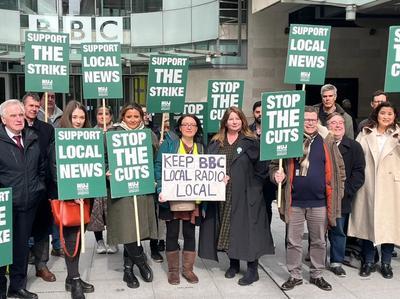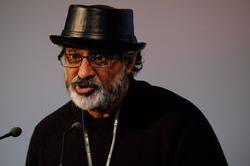DM2023: broadcasting
Widescale cuts to the BBC are denying some of the most vulnerable people, locally and globally, access to trusted news.
Public service broadcasting has had a bruising time in the past two years – Channel 4 was threatened with privatisation, a freeze on the BBC licence fee has meant huge cuts at the corporation, BBC World News and the BBC News Channel were closed and replaced with a new rolling-news channel and members in BBC radio in England have been on strike over changes which will undermine local news and programming.
Conference heard emotional speeches about the plight of members working in local radio.
BBC management wants local radio stations to share programmes across the network from 2pm on weekdays and at weekends, this will mean that less than half of the 100 hours programming will be relevant to a specific area. The union says the proposals will slowly kill off local radio which has 5.7m loyal listeners.

In her conference speech, Michelle Stanistreet said: “Members stood on BBC Local picket lines throughout England when they took 24 hour strike action in mid-March over an ill-thought out strategy that is seeing the BBC take an axe to BBC local radio in a move that cannot be seen as anything other than a monumental act of self-harm.
“If the BBC cared a jot about its duty to local communities and to the very principles of universality that underpin its relationship with licence fee holders, it would stop and think again. Our action was hugely impactful. TV regional news bulletins were taken off air, local radio shows had to be axed. The work to rule has built massive cumulative pressure, not least because it has demonstrated to BBC bosses outside of BBC Local just how much work is done in local BBC sites because of the sheer amount of professionalism, good will, and acting up of members day in day out."
The plans will mean job losses and journalists are having to re-apply for their own jobs. John Barsby, NEC member, said staff at BBC Local were being given 60 seconds timed by a stop-watch to say why they should keep their job and he had heard from one member who talked about suicide. He said: “I can’t believe that loyal and excellent broadcasters, some who have given 25 years’ service are being treated this way by the BBC.”
Sally Chidzoy, who had worked for the BBC for 32 years said what was happening in local radio made her blood boil. The connection between local viewers and listeners is being eroded, she said, and democracy undermined if journalists are not able to keep local politicians to account. It wasn’t just that, she said: “Local radio gives communities a sense of belonging – a friend in lonely world.”
The World Service’s budget has been cut by £28.5m per year with 382 posts (almost one in five) being axed. BBC Persian and BBC Arabic radio stations have been closed. Seven Asian-language services will become digital-only, meaning that almost half of the 41 foreign-language services will be digital-only. While the World Service was awarded an extra £20m, it soon became clear that this would not be used to stop these cuts and the aim to have a digital-first service would go ahead as planned.
A motion by the Broadcasting Industrial Council said “the most vulnerable and isolated local and global communities” will be affected by the cuts and conference backed a campaign to ensure the BBC’s linear services was retained and properly funded. The union also agreed to organise a lobby of Westminster MPs to highlight NUJ concerns at proposed BBC cuts to local radio programming and regional TV news coverage – Oxford and Cambridge have lost their local TV stations.
The BBC was forced to retreat early on when it felt the heat from a range of commentators saying its plans would drastically cut the diversity of programming. Raj Ford, NEC member, said: “Although the BBC has given some reprieve, there is a real danger to the future of black and Asian broadcasting in the organisation. Local radio provides opportunities for new diverse talent both on and off air. It has traditionally been a training ground for those, who because of their backgrounds, may not otherwise get a chance. It’s how I first started in the BBC. And the disillusionment continues with many of my black and Asian colleagues taking redundancy rather than stay in an organisation which doesn’t value them.”

A motion from the Black Members’ Council, proposed by chair Tony Adams, noted statistics in the BBC’s annual report 2022 showed ethnic minority staff are leaving in great numbers and there is a lack of progression and career opportunities, with the median grade for black and ethnic minority workers at the corporation is one lower than the median for white workers. The union will now call on the BBC to carry out a full equality audit.
DM welcomed the government’s decision to abandon its plan to sell-off of Channel 4, and agreed the union would campaign to ensure it fulfils its public service broadcasting remit.
Michelle Stanistreet said:
"The NUJ had worked with our Channel 4 members, alongside our sister unions in the Federation of Entertainment Unions and through our cross-party Parliamentary Group to oppose plans to sell the publicly owned broadcaster and major UK cultural asset to a private company. It was an important win against a government that has seemed to set its face to the intrinsic value - economically and culturally - of public service broadcasting."
